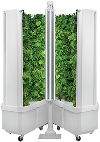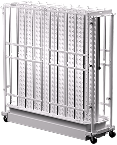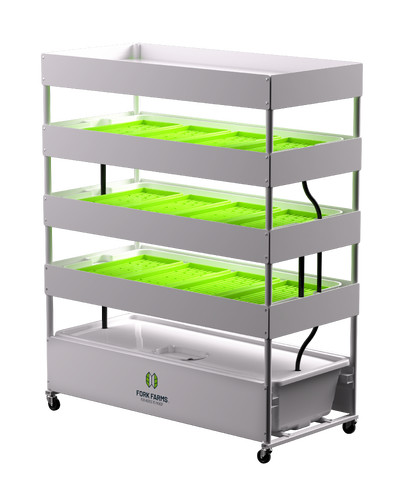The Sustainable and Fresh Impact of Hydroponics in Caribbean Communities
Often when we think of the Caribbean Islands, we think of crystal-clear waters and fresh foods. Unfortunately, there is a whole other side to the islands that suffers from food insecurity and climate issues. In October 2023, a climate-smart agriculture pilot project was launched to address food insecurity, promote sustainability, and empower vulnerable communities in the Caribbean to produce fresh, nutritious food all year long. It aims to mitigate challenges such as ongoing climate issues, escalating food prices, and widespread food insecurity through innovative, community-driven solutions.
The project was conceived by The Caribbean Climate-Smart Accelerator (CCSA), and brought to life through funding from the Sony Global Justice Fund, and the support of Fork Farms. To tackle persistent climate issues, high food prices, and food insecurity in the Caribbean, 12 Flex Farms, mobile hydroponic farms that can produce more than 25 pounds of lettuce, greens, herbs and a variety of other foods in 28 days, were installed in the islands – five in Anguilla, five in the Cayman Islands, and two in Barbados. Proving beneficial, soon after the CCSA program launched, the Cayman Islands added another 20 hydroponic units to their family of Flex Farms.
Why Hydroponics Work in Vulnerable Communities like the Caribbean
Food insecurity and climate change are significant issues in places like the Caribbean islands. More than half of the population in the English-speaking Caribbean remains food insecure and rapid climate change persists across the globe, with 2023 marking the hottest summer since records began in 1880. The Caribbean, specifically, is currently struggling with some of the hottest temperatures on record, which have severely impacted crop yields. Recent rising temperatures, pests, erosion, and extreme weather events have threatened the region’s agriculture. With all of this in mind, the Caribbean is forced to rely heavily on food imports, making it vulnerable to global market fluctuations, supply chain disruptions, and high food prices. More specifics on this climate-resilient project in the Caribbean can be found in this Forbes Magazine article.
Enter Hydroponic Growing Systems
Regardless of climate issues, land availability, adverse weather, etc., hydroponic gardens grow fresh foods sustainably, efficiently, and affordably, ensuring a steady supply of fresh, nutritious food throughout the year. Hydroponic growing systems can be set up indoors or in controlled environments, protecting crops from extreme weather, pests, and diseases exacerbated by climate change and environmental challenges. A Flex Farm requires only 9 square feet of space and a standard electrical outlet for operation and is designed to maximize space and resources. Compared to traditional agriculture, the Flex Farm requires zero food miles to be traveled and provides 45 times more food production. Growing food on-site and therefore uber-locally reduces the need for transportation, cutting down on carbon emissions and costs associated with importing food. Flex Farms are ideal to fit the needs of places like the Caribbean as they utilize 98 percent less water and land and require 40 percent less electricity than other hydroponic technologies. In a region where fresh water is scarce and temperatures are rising, these features are game-changers for fresh food production.
The Meaningful Objectives of the Caribbean Climate Smart Program are:
- to mitigate food insecurity through community-driven Climate-Smart technology and innovation
- to create livelihood opportunities, with a special focus on vulnerable communities, including women and youth
- to enhance food production while adapting to climate impacts
- to engage the community with knowledge and resources to implement sustainable practices to foster long-term success
Learning with Hydroponics on the Islands. How are Hydroponic Gardens Being Used in the Caribbean:
Hydroponic growing is not just about growing food—it is about growing knowledge, community, and resilience. Here is how the 32 Flex Farms are being used in the Caribbean islands.
Anguilla – Throughout the past 18 months, five Flex Farms in Anguilla have been used in primary schools where students and staff have not only consumed the fresh foods grown in the Flex Farm, they have learned about science, nutrition, agriculture, sustainability, and methodology. Watch our partners in Anguilla go through all of the steps - from installation to harvesting their fresh greens in the Flex Farms to help combat food insecurity.
Barbados - the two Flex Farms at Walkers Reserve in Barbados, are part of a broader regenerative effort to model sustainable farming practices and land use, and promote climate adaptation and resilience. Walkers Reserve is a 277-acre space that is the largest regeneration project of its kind in the region, making significant strides in addressing climate change and promoting sustainable development.
Cayman Islands – The Cayman Islands have used one of their 25 Flex Farms as part of a skills-building program at Beacon Farms, supporting individuals recovering from substance abuse, and the other 24 Flex Farms in local high schools' agricultural training. By incorporating hydroponic farming into agricultural training programs, students are being prepared for careers in sustainable agriculture and food production, and learning practical skills that are directly applicable to the local economy. Typically agriculture classes are not taught in schools, so this is a great and engaging way to expose students to agriculture and new sciences. The 25 Flex Farms in the Cayman Islands will produce more than 8,000 pounds of vegetables each year that will be integrated into school lunch programs and will complement the national school garden program.
The Future of Hydroponics in the Caribbean
The initial results from the CCSA project are promising and hydroponic farms have been a transformative tool, addressing food insecurity and providing a dynamic educational resource. By integrating innovative technologies such as hydroponics, these Caribbean countries have been able to enhance their agricultural yields, adapt to climate change impacts, and achieve sustainable food security for the community. They are producing food locally, reducing imports, and becoming more resilient communities each day. In addition, students and adults alike have been exposed to experiential, hands-on learning opportunities.
By integrating hydroponics into schools and community programs, the Caribbean is working towards cultivating a new generation of skilled individuals who are becoming equipped to tackle future food security and environmental challenges.
In the Cayman Islands alone, it is estimated that 750 people have been directly involved with and impacted by Flex Farms, the majority of these people between the ages of 6-18 years. Their Flex Farms are growing lettuces, bok choy, broccoli, kale, scallions, roselle, thyme, and basil. Multiple schools in the Caymans use their Flex Farms in business enterprise courses. Students harvest their farms and sell the fruits of their labor. They used their earnings to help fund prom for graduating students and they donated to animal rights organizations.
Looking ahead, The CCSA plans to expand this project to more nations to encourage further sustainable change. This project not only provides immediate relief to food insecurity but also empowers communities with the knowledge and tools to sustain themselves in the long term. The future of Caribbean agriculture is bright, and it starts with sustainable projects such as these. Stay tuned for updates on the project’s progress and its impact on Caribbean communities. Please visit Caribbean Accelerator on Instagram for project updates and visit CCSA to learn more and to get involved in making change for good.
Important Links:
























